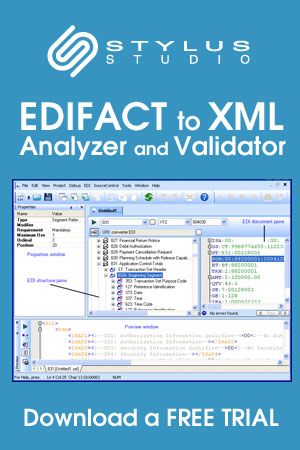

|
Return to Stylus Studio EDIFACT home page. Return to Stylus Studio EDIFACT D04A Messages page. Forwarding and transport rate information message
0. INTRODUCTIONThis specification provides the definition of the Forwarding and transport rate information message (IFTRIN) to be used in Electronic Data Interchange (EDI) between trading partners involved in administration, commerce and transport. 1. SCOPE1.1. Functional definitionThe function of this message is to request transport rate information and to answer to such a request. 1.2. Field of applicationThe Forwarding and transport rate information message may be used for both national and international applications. It is based on universal practice related to administration, commerce and transport, and is not dependent on the type of business or industry. 1.3. PrinciplesThis message may be used:
The transport sub-working group (D4) has developed recommendations for a harmonised implementation of this message through its subgroup ITIGG (International Transport Implementation Guidelines Group). Users implementing the message are strongly advised to apply these recommendations, which may be obtained from the D4 secretariat. 2. REFERENCESSee UNTDID, Part 4, Chapter 2.3 UN/ECE UNSM - General Introduction, Section 1. 3. TERMS AND DEFINITIONS3.1. Standard terms and definitionsSee UNTDID, Part 4, Chapter 2.3 UN/ECE UNSM - General Introduction, Section 2. 4. MESSAGE DEFINITION4.1. Segment clarificationThis section should be read in conjunction with the segment table which indicates mandatory, conditional and repeating requirements. 0010 UNH, Message headerA service segment starting and uniquely identifying a message. The message type code for the Forwarding and transport rate information message is IFTRIN. Note: Forwarding and transport rate information messages conforming to this document must contain the following data in segment UNH, composite S009:
0020 BGM, Beginning of messageA segment to indicate the type and function of the message and to transmit the identifying number. 0030 DTM, Date/time/periodA segment to indicate date(s) and time(s) applying to the whole message. 0040 FTX, Free textA segment to specify free form or processable supplementary information. In computer-to-computer exchanges free form text will normally require the receiver to process this segment manually. 0050 Segment Group 1: RFF-DTMA group of segments to specify a reference relating to the whole message and its date and time. 0060 RFF, ReferenceA segment to express a reference which applies to the entire message, e.g. rate note/commodity item number. 0070 DTM, Date/time/periodA segment to indicate date and time relating to the reference. 0080 Segment Group 2: LOC-DTMA group of segments to identify the routing and date for the rate information. 0090 LOC, Place/location identificationA segment to identify a location, e.g. place of departure/arrival. 0100 DTM, Date/time/periodA segment to indicate date(s) and time(s) related to the location. 0110 Segment Group 3: NAD-SG4A group of segments to identify a party and related contacts. 0120 NAD, Name and addressA segment to identify the party's name, address and function. 0130 Segment Group 4: CTA-COMA group of segments to identify a contact and its communications related to the party. 0140 CTA, Contact informationA segment to identify a person or department within the party. 0150 COM, Communication contactA segment to identify a communication number of a person or department to whom communication should be directed. 0160 Segment Group 5: TDT-DTM-LOC-RFF-CUX-MEA-SG6A group of segments to specify the transport and rate selection criteria and to indicate the rate information being provided. 0170 TDT, Transport informationA segment to indicate information related to the mode and means of transport, e.g. specific carrier. 0180 DTM, Date/time/periodA segment to indicate date(s) and time(s) relating to the transport details. 0190 LOC, Place/location identificationA segment to indicate a location relating to the transport details. 0200 RFF, ReferenceA segment to identify a reference relating to the transport details. 0210 CUX, CurrenciesA segment to indicate the currency in which the charges/rates are expressed. 0220 MEA, MeasurementsA segment to indicate an applicable weight or volume. 0230 Segment Group 6: TCC-EQN-PCD-QTY-PRI-MOAA group of segments to specify the rate information selection criteria and to indicate the rate information being provided. 0240 TCC, Charge/rate calculationsA segment to specify a charge/rate, e.g. freight rate. 0250 EQN, Number of unitsA segment to specify the number of units to which the unit price/rate applies. 0260 PCD, Percentage detailsA segment to specify the applicable reduction or surcharge percentage details. 0270 QTY, QuantityA segment to specify a quantity relevant to calculate the charge, e.g. chargeable quantity. 0280 PRI, Price detailsA segment to specify the price information of the charge. 0290 MOA, Monetary amountA segment to specify the monetary amount related to the charge. 0300 UNT, Message trailerA service segment ending a message, giving the total number of segments in the message (including the UNH & UNT) and the control reference number of the message. 4.2. Segment index (alphabetical sequence by tag)
4.3. Message structure4.3.1. Segment table
Return to Stylus Studio EDIFACT D04A Messages page. |

|
| Site Map | Privacy Policy | Terms of Use | Trademarks |